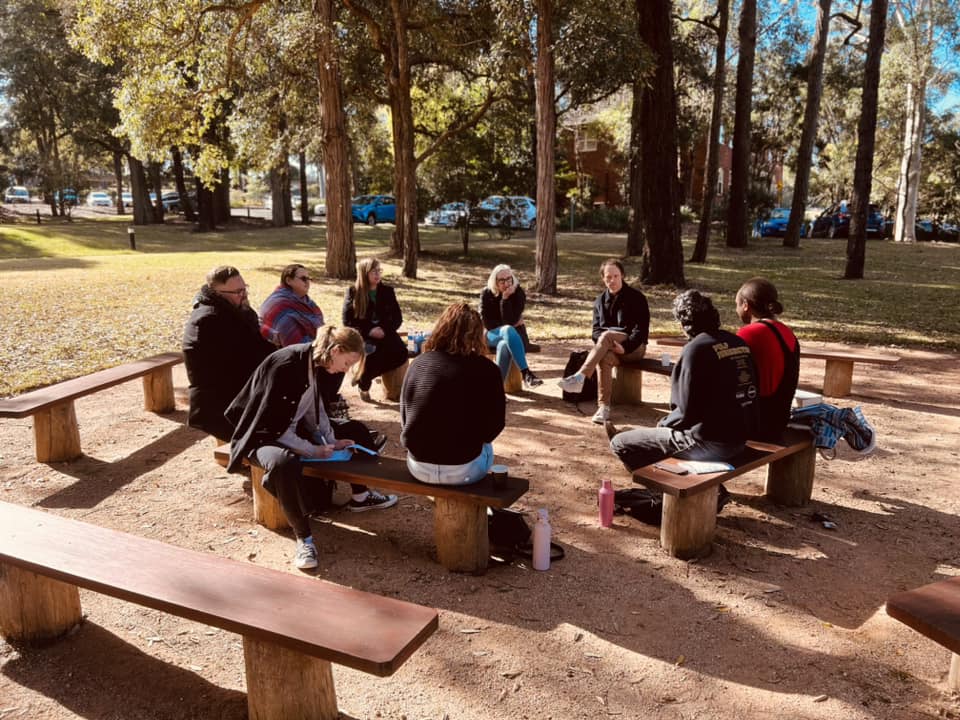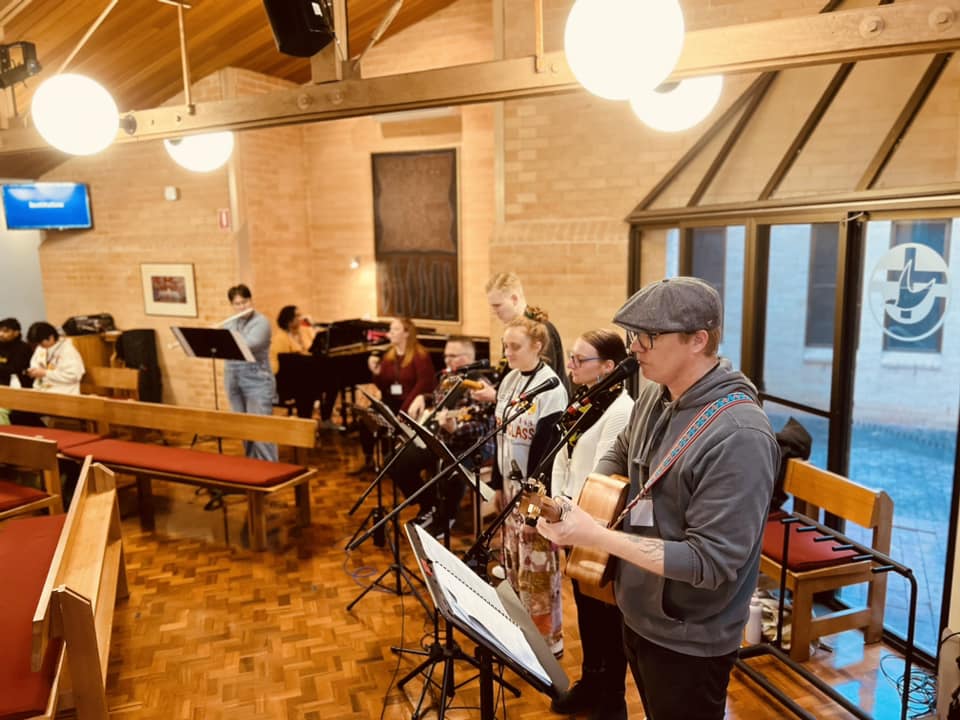From 30 June to 2 July, Uniting Church goers from across Sydney and beyond gathered at the Centre for Ministry in North Parramatta for School of Discipleship. This annual conference, now in its 19th year, presents a unique combination of community worship, keynote sessions, small group discussions, electives, and creative sharing.
The website sums it up best: School of Discipleship is “a reflective time for personal and movement renewal, a discipleship school, an alternative place for building biblical and political literacy. It is simply an inspirited educational space—a confessional space—for renewing the church and our lives in Christ.”
School of Discipleship kicked off on the Friday evening with opening worship, led by Rev. Janet Staines and complemented by a band of musicians helmed by Rev. Phil Newton and Rev. Radhika Sukumar-White. The liturgy introduced this year’s theme of “Neither Slave Nor Free: Privilege, Class, and Discipleship,” inspired by Galatians 3:23-28.
Over the course of the weekend, keynote speakers Professor Sathianathan Clarke and Rev. Jon Owen unpacked for those gathered the often-false dichotomy between being enslaved and being free. Sathi Clarke, Professor of Theology, Culture and Mission at Wesley Theological Seminary in Washington DC, explored the gospel of Luke to uncover the ways we can mistake enslavement to a particular way of being for freedom, and the ways that those with less privilege can demonstrate freedom.
His keynote address hinged on an alternative interpretation of Luke 17:21b, that “In fact, the kin(g)dom of God is in-between you.” Rather than a discipleship that is oriented upwards toward a God who is above us, or oriented inward to a God who is within us, Prof. Clarke encouraged attendees to recognise the ways “the kin(g)dom runs like a stream between you and me.” He expanded on this image as a divine invitation to step into the “stream” and become participants in “God’s dream for all creation.” Prof. Clarke then explored this concept and the theme of “Neither Slave Nor Free” through the story of the poor woman made whole in Luke 8:42b-47 and the story of rich Zacchaeus made whole in Luke 19:1-10.

Rev. Jon Owen is Pastor and CEO of the Wayside Chapel, and he offered those gathered a keynote address centred on belovedness: “Our deepest DNA is divine… we too often forget that.” He described how Jesus’ ministry began with baptism, with being named as beloved by God, which is a great place for discipleship to start. Rev. Owen spoke about how God comes to us disguised as the messiness and imperfection of our lives – often subverting what we have planned. He reminded attendees that is important to know what we are moving towards, not just what we are rebelling against, in the journey of discipleship.
After each keynote session, participants had the opportunity to wrestle with their theological learnings in community through small groups. Helen Wright, who led a small group, told Insights this was an opportunity to “ask ourselves how this all intersects with our own stories.”
“We were a range of ages, perspectives, church backgrounds and life experiences, so there’s both challenge and richness in that, and ultimately growth,” she said. “One of the key concepts we loved hearing from Sathi was that the kin(g)dom of God is ‘moving between us’. We got a taste of that as we talked together and listened for the Spirit.”
The conference also offered a variety of electives on different topics. Steff Fenton, co-founder of New City Church, invited participants to explore the ways Jesus aligned with and subverted ancient Roman ideas of masculinity and femininity. They then offered an interpretation of Matthew 19:1-12 that affirms eunuchs as people who transgressed gendered norms in a way that reveals divinity.
Other electives included “How to Talk About the Voice to Parliament,” led by Alice Salomon and Jono Row from the Uniting Advocacy team, which equipped participants to have “effective conversations that change hearts and minds” in the lead up to the referendum later this year. Prof. Clarke presented an elective titled “Passionately Christian and Compassionately Interreligious,” encouraging attendees to be “deeply informed by Christian sources and broadly informed by interreligious resources” in how they move through the world. Gabi Cadenhead also facilitated a workshop on “Creative Writing as a Spiritual Practice,” a welcoming space for participants to reflect on their learnings at School of Discipleship.
Saturday evening concluded with Songfest, a School of Discipleship tradition featuring a range of performances from improvised jazz to moving poetry to comedic re-enactment of Bible stories. This year’s MC Cheree Corbin described Songfest as “an act of creation.” Corbin told Insights, “If you spend a day and a half building community, the community is going to show up when you need it most. And that’s how it played out on the night – a loving, supportive community appreciating its artists.”
In place of the usual Question and Response segment of the SOD program on the Sunday afternoon, attendees were invited to participate in the first episode of the PULSEcast recorded with a live audience. Steve Molkentin from the Pulse team addressed audience questions to the keynote speakers and Rev. Janet Staines, giving those unable to attend a taste of the conference.
The weekend came to a close on the Sunday afternoon with worship, including Holy Communion and the litany of ¡Presente!: “a calling to mind of all those whose lives have been extinguished by hatred and violence, those who have died in the struggle for justice and peace.” This tradition originated in Central and Latin America, and has been a part of School of Discipleship since its inception, drawing on the “Cloud of Witnesses” who accompany us on the journey of discipleship.
School of Discipleship is made possible by the hard work of the organising team, especially Rev. Adrian Sukumar-White behind the scenes. Next year’s conference will take place on the first weekend of July 2024.
Gabi Cadenhead is a mission worker for Christian Students Uniting at the University of Sydney.












